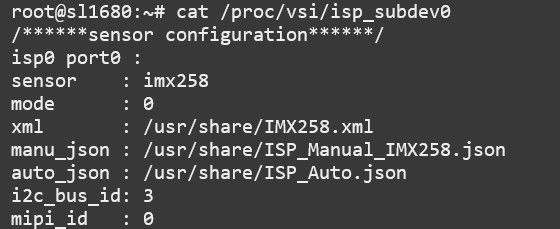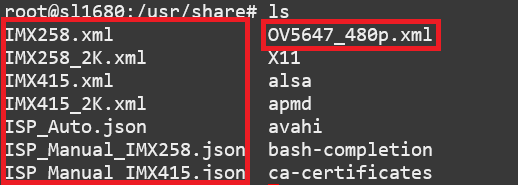Updating the ISP Sensor Configuration
SL1680 supports multiple camera sensors. By default, SL1680 is configured to use the IMX258 module. But, the software can be configured to use any of the supported sensor modules.
Supported Camera Modules
Sensor |
Module |
Interface |
Adapter Board |
DTS Change |
|---|---|---|---|---|
IMX258 |
Synaptics IMX258 Camera Module |
MIPI-CSI 0 |
Synaptics SL1680 MIPI CSI Adaptor Board |
No |
IMX415 |
Synaptics IMX415 Camera Module |
MIPI-CSI 0 |
Synaptics SL1680 MIPI CSI Adaptor Board |
No |
OV5647 |
MIPI-CSI 0 |
None |
Yes |
Changing the Camera Sensor Module
The file /proc/vsi/isp_subdev0 is used to display the sensor configuration properties and to update the sensor configuration.
Current Sensor Configuration
The current sensor configuration can be viewed by read from the /proc/vsi/isp_subdev0 file.

Reading the current sensor configuration
Configuring a New Module
To change the sensor configuration, update the /usr/sbin/isp_media_server.sh script. Change the line which writes
the sensor config to /proc/vsi/isp_subdev0. Update the sensor name, xml, and json files for the new sensor.

Each camera sensor module contains one or more XML configuration files located in /usr/share.

List of sensor config files
Then restart the isp_media_server service to apply the update.
systemctl restart isp_media_server
Note
To apply these changes to an image, modify the meta-synaptics/recipes-devtools/synasdk/files/isp_media_server.sh
script as described below.
Enabling the OV5647 Sensor
Using the OV5647 camera module also requires an update to the kernel’s device tree. This requires modifying the
linux-syna package using devtool:
devtool modify linux-syna
Modify the dolphin-rdk.dts file located in build-sl1680/workspace/sources/linux-syna/arch/arm64/boot/dts/synaptics.
diff --git a/arch/arm64/boot/dts/synaptics/dolphin-rdk.dts b/arch/arm64/boot/dts/synaptics/dolphin-rdk.dts
index ee1fbb6..3bcdea7 100644
--- a/arch/arm64/boot/dts/synaptics/dolphin-rdk.dts
+++ b/arch/arm64/boot/dts/synaptics/dolphin-rdk.dts
@@ -158,14 +158,6 @@
#gpio-cells = <2>;
};
- expander2: gpio@49 {
- compatible = "ti,pca9536";
- reg = <0x49>;
- gpio-controller;
- #gpio-cells = <2>;
- reset-gpios = <&expander1 4 GPIO_ACTIVE_LOW>;
- };
-
rtc0: rtc@68 {
compatible = "dallas,ds1339";
wakeup-source;
@@ -540,8 +532,8 @@
&isp_vsi {
status = "okay";
- enable-gpio = <&expander2 1 GPIO_ACTIVE_HIGH>;
- reset-gpio = <&expander2 0 GPIO_ACTIVE_HIGH>;
+ enable-gpio = <&expander1 0 GPIO_ACTIVE_HIGH>;
+ reset-gpio = <&expander1 4 GPIO_ACTIVE_HIGH>;
};
&isp_vsi_video {
Then update the isp_media_server.sh script to load the configuration for the OV5647 sensor. Apply the following change
to meta-synaptics/recipes-devtools/synasdk/files/isp_media_server.sh.
diff --git a/recipes-devtools/synasdk/files/isp_media_server.sh b/recipes-devtools/synasdk/files/isp_media_server.sh
index 20cbc24..0ba2e04 100644
--- a/recipes-devtools/synasdk/files/isp_media_server.sh
+++ b/recipes-devtools/synasdk/files/isp_media_server.sh
@@ -26,7 +26,7 @@ set -e
case $1 in
start)
- echo "sensor=imx258 xml=/usr/share/IMX258.xml manu_json=/usr/share/ISP_Manual_IMX258.json \
+ echo "sensor=ov5647 xml=/usr/share/OV5647_480p.xml manu_json=/usr/share/ISP_Manual_IMX258.json \
auto_json=/usr/share/ISP_Auto.json i2c_bus_id=3 mipi_id=0 mode=0" > /proc/vsi/isp_subdev0
echo -n "Starting $DESC: "
start-stop-daemon --start $SSD_OPTIONS > $LOGFILE &
Build the image with the updated device tree entries:
devtool build linux-syna
devtool build-image astra-media